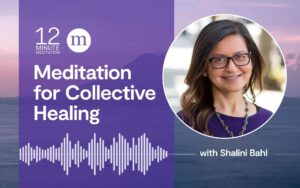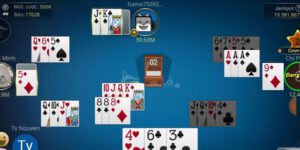Q&A: How Connecting With Our Senses Helps Psychological Well being and Resilience

Each considered one of us has seemingly had an expertise of feeling “caught” in a behavior loop or psychological state we want we may change. Most likely at a number of factors, you might have questioned: Why is it so troublesome to shift our views and behaviors?
Norman Farb and Zindel Segal are longtime researchers who research how cognitive coaching methods like mindfulness have an effect on psychological well being. Of their new e book Higher In Each Sense, they unveil a few of their newest findings on the science of behavior and alter—findings which may maintain the potential to assist thousands and thousands of people that wrestle with nervousness and despair to seek out reduction and resilience.
The findings in Higher In Each Sense emerge from pioneering analysis illustrating two distinct modes underlying mind perform: sensing the world and evaluating motion.
The human mind’s Default Mode Community (DMN) maintains habits for notion, thought, and motion, and it allows us to quickly and mechanically perceive conditions and resolve issues. In some instances, our habits could be useful. Nevertheless, psychological routines may also lock us into what Farb and Segal name a “Home of Behavior.” These habits can really feel restrictive and might trigger life to lose its spark. Feeling caught could make us really feel harassed, and once we’re in stress, the mind blocks out sensation, which makes the state of affairs worse as we miss necessary details about the state of affairs as it’s, as an alternative getting misplaced within the predictions and worries we’re projecting.
The query underlying their work grew to become, The place does change come from when behavior lets us down—particularly in terms of psychological well being and well-being?
And so they discovered the reply on this planet of sensation. In a observe they name “Sense Foraging,” they invite readers to deliberately shift their consideration from considering to sensing with a willingness to be shocked. After we do that, the mind relaxes and lets new data in. This helps us see new prospects and reconnects us with the colourful world round us, which in flip boosts our resilience, well-being, well being, and creativity.
Right here, Conscious founding editor Barry Boyce sits down with Farb and Segal to debate their analysis, the e book, and the way they hope their work can have a optimistic affect on the advanced world of public well being.
Hearken to the Full Dialog:
An Interview With the Authors of Higher in Each Sense
Barry Boyce: Earlier than we dive into the e book, I’d like to listen to from every of you a quick description of the principle analysis work you’ve been doing and any doable purposes. Perhaps we will begin with Norm.
Norman Farb: The analysis we’ve been doing has targeted quite a bit on individuals who’ve recovered from episodes of despair and who at the moment are attempting to remain properly. So they’re nonetheless fairly purposeful however on the identical time, they’ve this historical past. They’ve discovered to change into consultants at attending to this tremendous low temper state. So how do you unlearn that? Or maybe to place it higher, What different abilities are you able to study to compensate for this historical past?
We’ve led one of many largest scientific trials on this planet of people that have this historical past of despair, who then attempt to do some type of remedy to study lasting wellness abilities. That set of research actually are the muse for lots of the work that motivated the e book. Complementing that, we have now analysis trying on the primary neural mechanisms of issues like turning your consideration towards your senses and your breath, which is a foundational observe.
Then there’s some utilized wings the place we attempt to get undergrad college students to start out doing a grain of self-reflection every day. We get folks to start out having a little bit of intentionality round their very own psychological well being and well-being.
Barry Boyce: I at all times discover it fascinating to grasp the outline of despair as an ongoing default behavior or pathway that someone can hold reliably going to—and how are you going to interrupt that? Then having completed that, there’s an opportunity of relapse. How can these default habits be noticed?
Zindel Segal: The main target of my work has shifted, from gathering necessary scientific knowledge to warrant using mindfulness-based interventions within the context of psychological well being care, into the best way to develop means for growing entry to these exact same applications.
I concentrate on the event of on-line assets—like my collaboration with Sona Dimidjian on creating Mindfulness-Based mostly Cognitive Remedy applications for mothers with histories of despair—after which look to see what the boundaries are in some well being techniques to roll out these exact same assets which are exhibiting good profit. I feel a part of the sting proper now’s the understanding that the info are sturdy sufficient to warrant adoption, however that the channels of distribution are actually nonetheless fairly restricted. And in some methods, that was a motivating purpose to attempt to write a well-liked science e book, within the hopes that it may get into extra folks’s fingers moderately than a couple of folks studying about this in scientific journals, however actually not shifting the needle very a lot in any respect.
Barry Boyce: People usually consider public well being as solely being about issues like viruses and people sorts of illnesses. However despair and different temper issues qualify clearly as a public well being drawback. If we discover or create a factor that appears to be working, how do folks discover their method to it? Why don’t you allow us to hear your origin story about how the 2 of you stumbled into this e book.
Norman Farb: We’ve been working collectively since I used to be a graduate pupil, simply beginning to run among the early research on what occurs when neighborhood members do Mindfulness-Based mostly Stress Discount collectively.
However I feel what actually drove us is we began to appreciate that we’re discovering what appear to be pretty common mechanisms about how the thoughts offers with stress, and the way folks can study to manage higher with their stress utilizing the conscious interventions that we’ve been learning.
Past simply people who find themselves seasoned meditators, we’re interested by a public well being strategy, and there’s this query of, Effectively, what in regards to the people who find themselves by no means going to meditate? There are nonetheless a variety of makes use of which are relevant in on a regular basis life and that may convey everybody up.
We now have entry to a few of these common mindfulness ideas that we’re touching upon, and one we will discuss is this concept that stress really shuts down our skill to soak up sensory data. We may present that data to the general public and one thing to do about it which will appear to be meditation, however may additionally be accessible in quite a lot of different methods.
It could be a reasonably low funding with a considerable or measurable return in a really giant group of individuals. We’d really have the ability to do some good that manner. So the motivation for the e book got here from considering we have now one thing that’s doubtlessly common right here, and the way will we get that concept throughout, even when it’s not the total trajectory of what may occur in contemplative coaching?
Zindel Segal: Norm and I’ve spoken quite a bit about the concept that there are totally different descriptions of the chance for folks to expertise two totally different states of thoughts across the identical bodily phenomena. There’s the being mode and the doing mode.
You may eat through the doing mode and issues are automated and infrequently hurried, or you possibly can eat through the being mode, during which you’re really tasting and rather more deliberate and current. That may be very liberating as a result of it lets folks know that every thing the thoughts is telling you possibly can typically be discrepant from precise expertise. That’s very precious. However these sorts of insights might come from long run meditation observe, and we all know only a few folks will undertake that.
So we recognized that sensation appears to be a key portal by way of which individuals can swap right into a receptive mode of sensory expertise. Via the e book, we’re actually attempting to recommend that these two modes exist, and stepping out of 1 into the opposite is so simple as shifting your consideration and opening as much as that. If folks can style a few of that, I feel that that’s a big measure of our e book completed proper there.
Barry Boyce: I wish to leap straight into the e book, in chapter six, the place I discovered a nugget. It’s the place you say that sensation is the place the motion is. So what do you imply by that? What led you to that conclusion? What does that suggest?
Norman Farb: We’re seeing converging proof that not getting access to sensation is usually a predictor of poor psychological well being vulnerability. Sustaining entry to sensation within the face of misery is a very nice indicator that you just’re going to be dynamic and resilient. You most likely will really feel extra within the second, however you’ll have the ability to really feel one thing else sooner or later. You gained’t simply get caught within the stressor, caught within the detrimental emotions, as a result of the data continues to move.
We’re seeing converging proof that not getting access to sensation is usually a predictor of poor psychological well being vulnerability.
In order that’s one of many essential messages of the e book and why, if we’re considering from a well-liked perspective, we actually wish to get throughout that folks must take the advantages of sensory consideration extra severely. This led us to provide you with phrases like Sense Foraging as an actual intentional observe of entering into your senses.
Barry Boyce: Are you able to say extra about this behavior of shutting out sensation? What’s that about?
Zindel Segal: Within the remedy world, sensation is having a heyday, pointing to the physique being an necessary nexus for the processing of detrimental emotion. In some methods, it’s a counter response to an emphasis on having the ability to assume one’s manner out of issues by correcting assumptions or beliefs or defective interpretations, and recognizing that working within the physique and thru the physique can present an experiential launch from the way in which during which pressure and freezing and shutdown can happen.
You even have among the work round polyvagal responses, which characterize complete physique states that folks can implicitly transfer into. So the remedy world is type of abuzz with the notion of the significance of sensation, significance of the physique. And I feel a part of what’s being echoed in each that work and what we’re seeing is, shifting from considering into sensing could be a very healthful act. In relation to having the ability to do this in our e book, we’re attempting to assist folks see how that might feed into flourishing and the way that might feed into well-being in a bigger sense.
We don’t have a selected program that folks need to observe, however the thought is that our feelings characterize themselves within the physique. If we take into consideration feelings, we’re one step faraway from feeling them. If we really really feel them within the physique, we have now extra of a deal with on what they’re doing. And typically by finding ourselves within the second, what they’re doing to us could also be fairly totally different from what the thoughts is telling us they’re doing to us, and there could also be some reduction or some optionality that presents itself. That’s why once we say, sensation is the place the motion is, we really feel there’s a variety of traction that may be gained by beginning to acknowledge that.
If we take into consideration feelings, we’re one step faraway from feeling them. If we really really feel them within the physique, we have now extra of a deal with on what they’re doing.
Barry Boyce: To date we’re simply speaking about sensory activation being the place the motion is. So is it an entry level? Is it fully unrelated to mindfulness meditation?
Norman Farb: I feel it’s okay for these ideas to overlap. And naturally they do within the totally different foundations of mindfulness, mindfulness of the physique being the primary basis. This concept of really opening your self as much as your senses is like the start of an extended arc which will finally lead by way of emotions and ideas after which metaphysics and deeper insights.
I actually assume what we’re attempting to do right here perceive what’s so necessary about sensation. Why begin with sensation? What does it imply to be human and have this conceptual thoughts, and in addition this skill to be linked to the world and to lose observe of that connection? Why would even a mindfulness observe begin there? And if we actually understood that mechanism, we may maybe extra deeply perceive a few of these entry factors to mindfulness and different contemplative practices. We may perceive the mechanism in methods that aren’t ensconced inside simply the mindfulness custom.
With this concept of sense foraging, of studying to truly shift into this receptive mode of sensing, we see all human beings have this capability. Many people usually are not exercising this capability. Mindfulness traditions undoubtedly start with directions which have stood the check of time, which are a method of shifting out of this sort of conceptual thoughts and right into a receptive thoughts—of not simply at all times combating with the thoughts, however really basically realizing that there’s a shift whenever you let stuff in.
So long as it type of follows these ideas, you discover your manner of sense foraging. It undoubtedly overlaps with mindfulness, however it’s not simply mindfulness. And mindfulness is a lot extra than simply foraging. Nevertheless it does appear to be sense foraging is a foundational observe inside mindfulness, that possibly there are many different ways in which folks can entry the form of common know-how of shifting from doing to being.
Barry Boyce: Effectively, then let me ask a query. Say there are two folks swimming, Bob and Joe. They’re each doing the identical factor, however Bob has understood one thing about sense foraging. What’s the distinction?
Zindel Segal: The one who is sense foraging, possibly they’ve a backyard of their yard they usually go and spend simply 5 minutes within the morning flowers, totally different colours, feeling the totally different temperature. It’s training having the ability to step into this receptive mode the place they’re not anticipating, they’re simply receiving, type of placing the thoughts into a distinct place whereas the world comes into them.
The expertise of sense foraging mainly stops there, whereas a mindfulness observe would proceed going deeper. However can these sorts of moments allow folks to construct one thing into their very own lives, the place the style of the receptive mode could be regularly obtainable to them, and assist them in different ways in which have but to be documented and explored? Very probably.
I feel we’re nonetheless on the early fringe of all of this work. So we don’t see it as an alternative to mindfulness. However we really feel prefer it’s price a shot, particularly as a result of our brains, as we all know, are extra able to providing this receptive mode to us the extra we observe. It brings to thoughts a phrase that Sharon Salzberg as soon as stated: “Temporary moments, many instances.” So, unmediated expertise, transient and acquired and repeated many instances, moderately than a second that’s elaborated cognitively—it begins out as one factor, turns into one thing else, after which it turns into a narrative. I feel these moments of sense foraging are sometimes capable of supply a quick second, and possibly solely that.
Barry Boyce: How do you hope readers will really use this e book? You’ve made some ideas, however I’d such as you to say extra. What kind of particular person do you envision making use of it?
Norman Farb: I feel we’re on the lookout for a reader who actually needs to have a deeper appreciation of a mechanism. They don’t simply wish to tackle authority as a result of somebody with these credentials or the non secular imaginative and prescient or no matter stated so. They are saying, “In case you give me a very good ‘why’ then I’ll strive one thing. I’ll be open minded in the event you may give me a very good mechanism in a great way.” I feel that’s the audience, and somebody who’s actually looking for a method to get unstuck. Somebody who’s doing the correct issues, who’s attempting to stay a very good life, and continues to be simply feeling this stickiness, this dissatisfaction and isolation.
We now have extra data than ever about the necessity to handle psychological well being,the concept that we will do issues which are helpful, the analysis that’s popping out of all of the totally different actions we will do—however it’s a must to be there for it.
Barry Boyce: Might you say one thing about what’s adaptive in regards to the mind as a predictor and what additionally could possibly be problematic? Why is the aspect of shock necessary in terms of sense foraging?
Zindel Segal: It’s actually useful for folks to study that we’ve developed evolutionarily to have the ability to predict what’s coming subsequent and that the mind is de facto specialised to interpret indicators each from inside our our bodies and indicators from the surface atmosphere to assist us optimize survival.
A few of these indicators is likely to be very typical indicators: your coronary heart begins to race, you might have a fever, you’re feeling dizzy—that’s going to ship off an alarm sign. In case you are strolling on the road and in entrance of you distant, there’s a bushy animal, it is advisable to work out if it’s a coyote or a canine. So the mind has, as its primary job, the flexibility to foretell what’s coming subsequent. That’s actually useful in lots of, many circumstances to foretell what’s coming subsequent after which to depend on the previous to generate options based mostly on issues that possibly you’ve learn or heard different folks say to allow drawback fixing, to optimize issues, and make them go away. It’s not such an incredible template for coping with feelings which are considerably chaotic, that may be cloaked, that may have a number of, simultaneous meanings. And so the identical options which are usually pushed by routine and behavior get utilized to our emotional lives.
Freud was one of many first folks to provide you with among the descriptions of how feelings could be hidden from ourselves, how they’ll have a number of meanings on the identical time. This isn’t an excellent drawback for a predictive coding model of our minds to attempt to take care of. As a result of with a number of meanings, contradictory meanings, ambivalent meanings, the pure tendency is to wish to cut back ache by denying and suppressing.
The worth of the sense foraging perspective is to permit us to step out of this stock of psychological routines which were used time and time once more to point out us that there could also be another alternatives obtainable to us that don’t contain leaping instantly to fixing, to resolving. Which will contain unanticipated methods that contain curiosity or investigation.
In different phrases, preserving the sign alive moderately than burying the sign or reducing off the sign. And the way will we make that shift? That’s a tough shift. And so the weather of the sensory world allow us to do this, as a result of there’s a sense during which that chaotic world that has chaotic parts can usually shock us. And shock could be a manner of suggesting to us that there’s extra on this planet than our minds can ever anticipate and by no means describe to us. If folks have that have usually sufficient, typically it could actually assist them get a bit of little bit of area round these different reactions and see the place issues go.
Shock could be a manner of suggesting to us that there’s extra on this planet than our minds can ever anticipate and by no means describe to us. If folks have that have usually sufficient, typically it could actually assist them get a bit of little bit of area round these different reactions and see the place issues go.
Barry Boyce: Let’s discuss timeliness. You’ve already made some ideas about methods during which the e book is well timed. In remedy, there’s a motion afoot to convey sensory extra into scientific purposes. So in what methods is sense foraging and your e book notably well timed?
Norman Farb: We now have proof from a couple of totally different fronts that it actually is required greater than ever, this skill to to reconnect with what’s occurring round us. There’s the ubiquity of screens (we’re speaking by way of screens proper now). The priority for future generations’ skill to simply have common consideration, not even speaking about tremendous meditator consideration or something like that. Given the atmosphere we’re in, the concept that we’re an consideration financial system the place essentially the most treasured commodity an individual can have is the flexibility to captivate us. And as a consequence of that, we see that the charges of analysis of tension have greater than doubled previously decade or two. Despair is now going to be a number one explanation for incapacity on this planet. In the UK, they’ve established a minister for loneliness due to how disconnected individuals are feeling.
The factor that’s essentially the most tragic about it’s we’re dwelling in a time of profound abundance, proper? However are we actually capable of have that remaining talent that we want, which is to place ourselves on the market, to utilize the type of issues that we all know make life enriching? And based mostly on all these detrimental issues that I’ve simply been mentioning, it seems that that remaining step is lacking. This concept that individuals are languishing regardless of the abundance that we inhabit, that we’re we’re caught up in narratives in regards to the finish of the world and tragedy and despair which exists on this planet, however we don’t have the talent to steadiness that with the conclusion that there’s a lot magnificence, connection, love, and alternative for company. I feel that’s the timeliness of a message like this: that you just’re so shut, that on the opposite aspect of this despair and hopelessness is the potential for engagement. It’s going to be fairly scary to get engaged when what you imagine is already that the world outdoors is a detrimental and doubtlessly unforgiving or unsafe place to be. However with out that engagement, you’ve already condemned your self to proceed to stay in that set of expectations in that hopeless world.
This concept that individuals are languishing regardless of the abundance that we inhabit, that we’re we’re caught up in narratives in regards to the finish of the world and tragedy and despair which exists on this planet, however we don’t have the talent to steadiness that with the conclusion that there’s a lot magnificence, connection, love, and alternative for company. I feel that’s the timeliness of a message like this: that you just’re so shut, that on the opposite aspect of this despair and hopelessness is the potential for engagement.
These practices that flip the script can be found if we’re capable of simply take small dangers, like speaking to somebody we might usually not speak to, opening up emotionally, letting ourselves simply really feel issues for some time as an alternative of at all times attempting to resolve issues after which questioning why. I feel we want this sort of messaging greater than ever. If this e book itself is only one manner of individuals beginning to get up to their very own efficiency, in having the ability to re-engage with their lives, then that’s nice.








